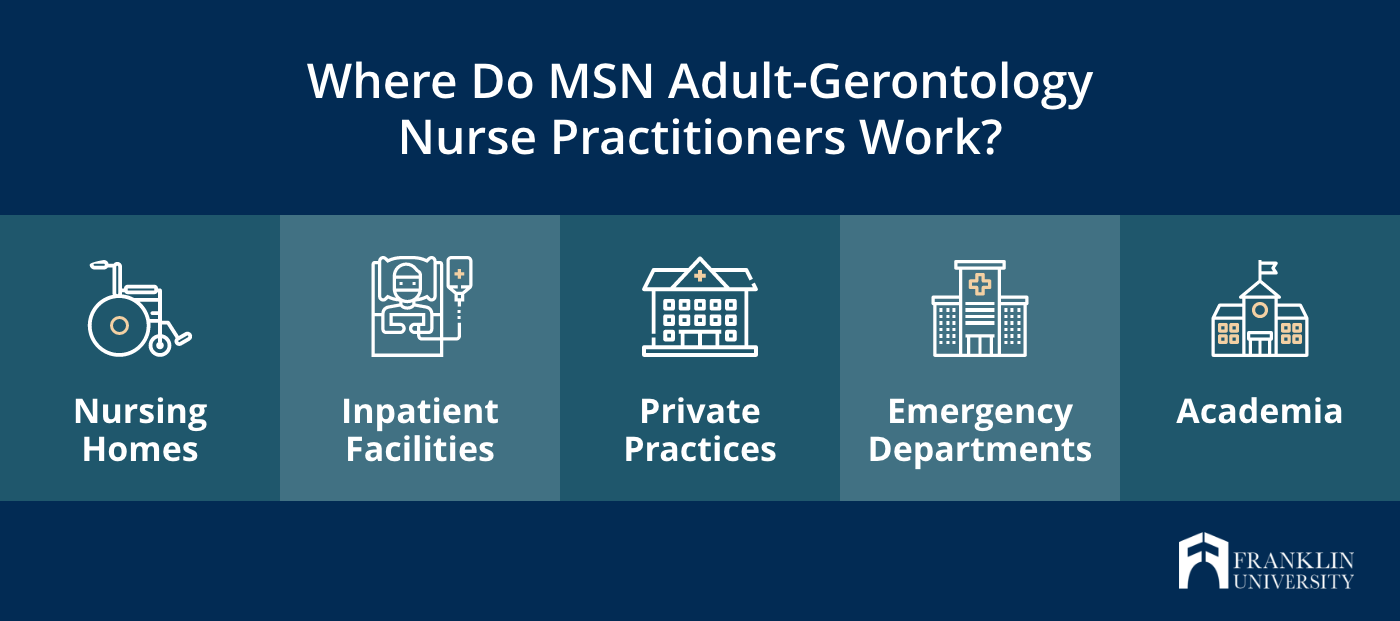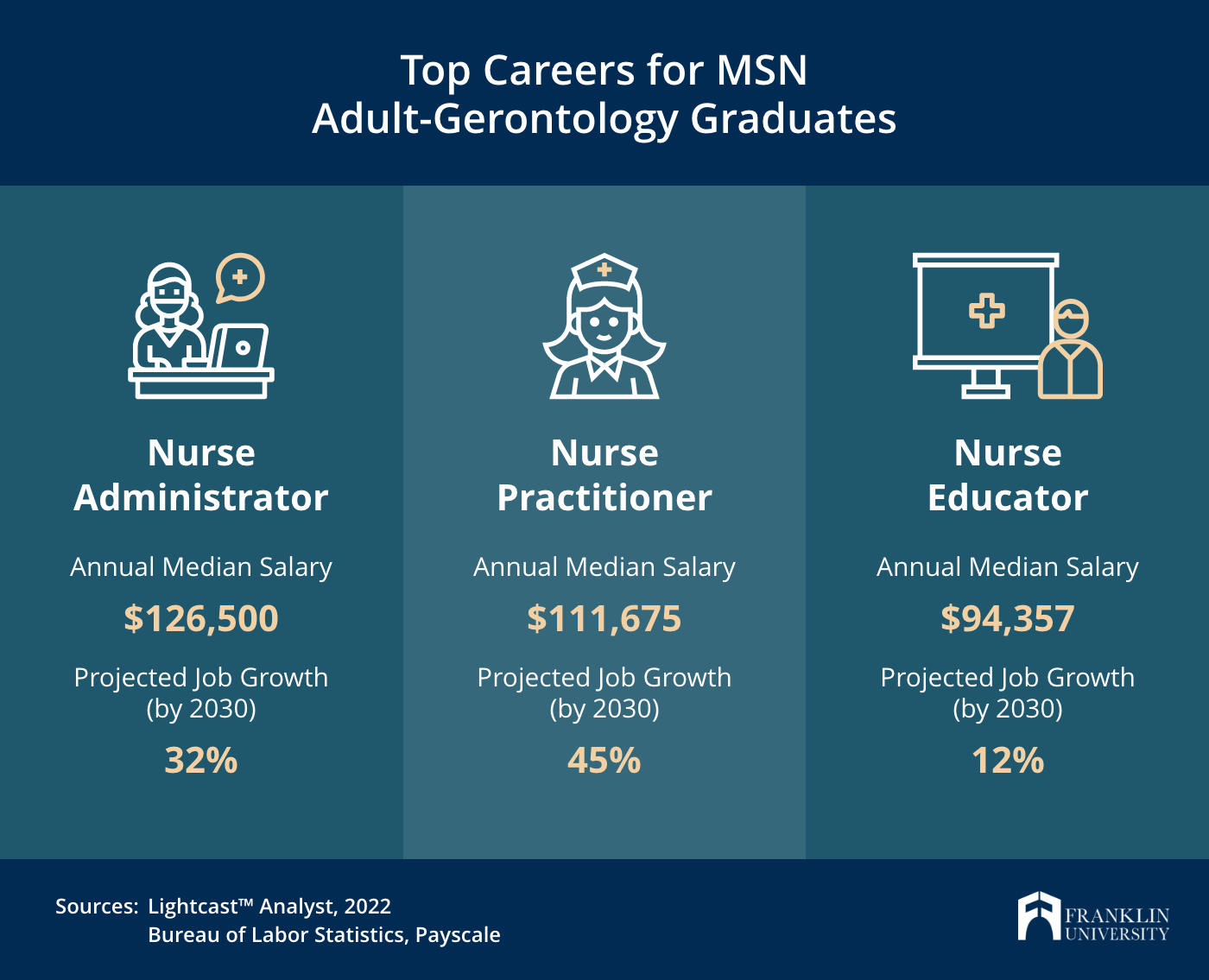Request Information
We're Sorry
There was an unexpected error with the form (your web browser was unable to retrieve some required data from our servers). This kind of error may occur if you have temporarily lost your internet connection. If you're able to verify that your internet connection is stable and the error persists, the Franklin University Help Desk is available to assist you at helpdesk@franklin.edu, 614.947.6682 (local), or 1.866.435.7006 (toll free).
Just a moment while we process your submission.

What Can I Do with an MSN in Adult-Gerontology?
Across the next decade, the fastest growing profession in the United States will be nurse practitioners. Opportunities in these areas are expected to grow by 45% which is faster than any other occupation (according to the U.S. Bureau of Labor Statistics). And there will be a particularly pressing need for adult-gerontology primary care nurse practitioners (AGPCNP). That’s because of the one-two punch of an aging U.S. population and the retirement of existing healthcare providers.
Are you considering an AGPCNP career? There are several paths that you can take to achieve that goal. Earning a Master of Science in Nursing (MSN) with a specialization in adult gerontology is a popular choice for people with a particular affinity for an older patient population.
What is an MSN-AGPCNP?
The MSN-AGPCNP is a master’s-level degree with a specialization that enables nurse practitioners to treat the specific needs of an older patient population.
Earning this degree involves a combination of classroom instruction and practical experience. It typically takes 2-3 years to complete an MSN track with most programs also requiring an average of 500 clinical hours as well.
With this degree you will be able to:
- Provide leadership in diverse settings to promote high quality, safe, effective patient-centered care.
- Appraise, use and participate in the extension of nursing knowledge through scientific inquiry.
- Integrate current and emerging technologies into professional practice.
- Demonstrate responsive leadership, collaboration and management to influence the advancement of nursing practice and the profession of nursing and to influence health policy.
- Integrate clinical prevention and population health concepts to provide holistic, comprehensive nursing care for individuals and their families.
Having an MSN will also widen your career options, both in what you want to do and where you want to do it.
What Can You do with an MSN-AGPCNP Degree (and Certification)
With an MSN-AGPCNP degree you will have an opportunity to move in several career directions. But before you can pursue any of them, you must earn your board certification. Certifications are managed by independent organizations that work to ensure a consistency in knowledge and understanding for someone who wants to take on a specific career.
To earn an AGPCNP board certification you must pass a comprehensive, nearly 4-hour exam around all of the base level knowledge you should have for the care and treatment of older patients.
There are two primary organizations that certify AGPCNPs — The American Nurses Credentialing Center (ANCC) and the American Association of Nurse Practitioners (AANP).
The good news is that when you pass you won’t have to take the certification exam again for another five years. You’ll also be able to change your job title to AGPCNP-BC or Adult-Gerontology Primary Care Nurse Practitioner-Board Certified.
With a board certification you can capably increase the care options that you provide to an older population. Those include:
- Medication management where you ensure each prescription is current and relevant. This is important because many older patients continue to take medicine they may no longer need just because it was once prescribed.
- Diagnostic test plans including labs, biopsies and out-patient tests.
- Treatment plan formation to ensure a patient has the specific instructions for the management of age-related illnesses.
- Medical plan creation with the information needed so patients can age-in-place.
- Population-appropriate health assessments are important for older patients who have different physical needs and reactions. To accurately understand their health issues, it’s important to assess them based on age-specific criteria.
Get a FREE guide to help you advance your career, featuring helpful advice and thoughtful insights from nursing experts.
Where Can You Practice with an MSN in Adult-Gerontology

When you have earned an MSN in adult-gerontology, you will also set yourself up to take advantage of a wide range of practice opportunities. Opportunities exist in the public and private sectors, including government agencies, social service organizations, hospitals, nursing homes, quick care clinics and even retirement communities with primarily older residents.
There is a particularly growing need for AGPCNPs in:
Nursing Homes
You will have an opportunity to work with patients who are permanent residents and those in a transitional living arrangement. In both cases, you’ll help structure customized treatment programs that could involve leading physical exams, performing medical history reviews and managing medication needs.
Inpatient Facilities
Work here for an AGPCNP is a balance of care and analysis. You may find yourself evaluating labs and medical test results and then using that information to structure a care plan that meets a patient's immediate health needs while also continuing that care post-discharge.
Private Practices
With your degree you can choose to work inside of an established medical practice or open your own private practice. In both scenarios, you’ll be offering primary care services including performing exams, ordering and reviewing labs and other tests, prescribing medication and working with the patient’s other providers to ensure a comprehensive care program.
There is also an opportunity here to make an impact particularly in traditionally underserved areas such as with clinics who treat the uninsured, caring for the homeless and practicing in rural settings.
Emergency Departments
As you might expect, work in an emergency department is fast-paced and at times stressful. It is also extremely rewarding. In an emergency department, an AGPCNP is best prepared to provide care and, just as important, support to an older patient under duress.
Academia
Because an AGPCNP relies heavily on critical-thinking skills, they are distinctly dispositioned to take on a role in education. Particularly after having several years of practical experience. Their expertise is prized because they can bring a measured, experienced approach to classroom learning.
Top Careers for an MSN in Adult Gerontology

There are a number of career paths open to AGPCNPs. Three of the most popular positions an AGPCNP finds themselves in – Nurse Administrators, Nurse Practioners and Nurse Educators – enable them to practice medicine and also help others sharpen their healthcare skills.
1. Nurse Administrator
In most instances, the nurse administrator has transitioned away from patient care into a position that supports those caring for the patients. As the name foretells, this role is all about administering care services, support, tools and training opportunities.
Annual Median Salary: $126,500
Projected Job Growth: 32% by 2030
2. Nurse Practitioner (NP)
An NP provides a range of healthcare services to patients. These can include helping the patient manage chronic conditions, ordering and reviewing labs and tests, and overseeing patient intake and providing an initial diagnosis.
Annual Median Salary: $111,675
Projected Job Growth: 45% by 2030
3. Hospice Care Nurse
Working in a hospice care setting can offer an AGPCNP a particularly rewarding feeling. A feeling that comes from helping people meet the end on their own terms, of being a shining face in dark times and of being a patient advocate for when a patient needed one the most.
Annual Median Salary: $79,900
Projected Job Growth: 25% over the next year
4. Home Healthcare
One of the most important movements in senior care recently has been to help older patients age-in-place. That means that an AGPCNP in home healthcare has to evaluate the patients health along with the health of their environment.
Annual Median Salary: $115,482
Projected Job Growth: 33% by 2030
5. Specialty Care Provider
As patients get older they tend to develop health issues with areas such as cardiology, pulmonary and rheumatology. An AGPCNP working in a specialty clinic can put all of their geriatric understanding to use as they try to find ways to treat the immediate
needs, and long-term effects, of a centralized health concern.
Annual Median Salary: $118,633
Projected Job Growth: 36% by 2030
Taking the Next Step
Skills. Knowledge. Confidence. Those are three key things that earning an MSN as an Adult-Gerontology Primary Care Nurse Practitioner (MSN-AGPCNP) will give you.
An MSN doesn’t just have the potential to change the career path of an AGPCNP, it also has the potential to change how an AGPCNP provides care. Earning a master’s in nursing also provides career freedom as it expands where you can practice.
All of this can happen with Franklin’s MSN-AGPCNP program. It’s been specifically designed to provide working nurses with an opportunity to build the next stage in their career without derailing their current one.





